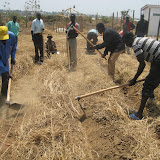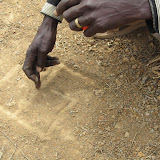In August Diantha and I attended the Sudan Roundtable, held in Uganda, with 6 of our Sudanese colleagues (pastors, laypersons, women, youth) as well as representatives of every United Methodist interest doing substantial mission in Sudan: East Africa Annual Conference; UMCOR, Women's Division and others from GBGM; Ginghamsburg United Methodist Church. The idea was to listen to representatives of the Sudanese United Methodist Church speak of their priorities, and talk about how we might increase our coordination and cooperation to meet these needs. A new District Advisory Committee set up by the new District Superintendent Fred Dearing had after much discussion and discernment settled on Eliminating Poverty and Reducing Killer Diseases as their first and second priorities, respectively. After two intense days of discussion in Uganda, we hope and pray that the resulting work by all the partners in mission in Sudan will continue to act on these priorities. As we reflected on them ourselves out of our one short year of experience on the ground here (and several years of work in these areas in the US) we came up with suggestions for principles that might guide the work of eliminating poverty, and that we are trying to practice:
1. Support projects that work with people, not just for people. We are currently using the church/village planning approach: the church/village picks the project area, the District sets budget limits within funding available, village and District work together to make the project fit budget. Building the capacity of the local church/village to manage their own development is more important than any concrete outcome: strengthening the experience of owning the process, learning to approach a big task/far goal step by step, learning to realize and bring their own assets into the project (materials, labor) so that the process is genuinely a partnership between the church/village and the District, and becomes culturally sustainable with local leadership beyond our involvement. Pastors appreciate being clear and consistent about following Biblical principles for the way the outside resource-provider assists the church/village for the up-building of all the UM churches in South Sudan. These include:
i. Equality (Acts 2:44-45) no one has too little or too much, and
ii. Accountability (Matthew 25:14-29) what have you done with what was given?
Diantha and I continue to practice these principles as we hold churches accountable to the changes they have made in their project plans, especially when that means they run short of money! We gently remind them as we have from the beginning that we have the same amount of money to help each church (thank you, Holston Conference!) and that if they change the project from the plan and budget agreed upon, they need to also take responsibility to find the resources to finish the project.
iii. Participation (Mark 6:35-44) start with what you have, even if it is small. We have been gratified to find how willing the church members and village neighbors have been to raise more money, to dig latrine holes, to make bricks and build school shelters, and find a variety of ways to contribute their part to the project benefiting their church and village.
iv. Planning (Luke 14:28-30) count the cost before starting. One or two churches have led the way by planning ahead and saving some of their harvest to provide seed for the next season; we have copied their example in providing all the churches with seeds on the condition they make a commitment to do the same thing, as well as planning to use some of the harvest also to help the needs of widows and orphans that are in each church.
2. Increase wealth by building on the asset base: this means that the main emphasis for the Sudan District UMC is on sustainable agricultural development which multiplies amount of crops that can be grown in a given area and in a given time by using improved methods of conservation farming while still using hand tools and homemade inputs rather than purchased fertilizer, pesticide, etc. Recently we have given each church a moringa tree and several papaya trees after the pastors attended a workshop teaching them the nutritional benefits of moringa and the medicinal benefits of papaya.
3. Improve the capacity to manage, not just increase, wealth. Projects eventually must be financially sustainable beyond our involvement. Our Microenterprise Program (PUMMP) teaches this to pastors and church leaders; we just graduated the first class of 6 pastors and gave them loans. Pastor Faustino of Ligitolo said, “This is the training we have been needing to improve ourselves!” Now we have started training a second group of 9 pastors in business management, this time in the local language (Kakwa), and we plan to hold training for churches on managing projects; to seek funding for a village savings bank program that includes financial management; and to develop workshop on managing personal finances for pastors, women, youth and other church leaders.
4. Start now developing leaders who can take over the work. One way to do this is to strengthen local leaders to get out of poverty themselves so that they can help others to do so, beginning with pastors, who receive little to no salary. Local people are increasing their ability to manage church/village planning (Pastor Isaac Sebit), manage the Eden Teaching Farm (Alex Lupayi), and manage the PUMMP training and the personal financial management training (Joice Jaka). With the help of short-term volunteer Thomas Sherbakoff, we trained 3 key church leaders in Basic Fund Accounting so they can handle the larger amounts of funds coming in to various District programs.
5. Make training a priority over equipment/materials. Many NGOs and mission efforts in the past have provided tractors and other pieces of equipment that are now lying unused, broken or rusting because of problems such as: Who can repair it? Where do you get replacement parts and how do you afford them? Who can afford the fuel? Other problems include disputes over ownership and management of the equipment. In our Basic Farming Methods training for 31 village farmers we gave hoes, machetes, and seeds only after they completed training; the pastors received a Moringa tree seedling only after attending the Moringa training. Diantha just coordinated a training for Traditional Birth Attendants that significantly increased the skills of 46 village women, who then receive 10 UMCOR birth kits each to carry out their new knowledge. We are hoping to get funding for a program to build the capacity of United Methodist Women groups so they can develop the capacity to handle income-generating pieces of equipment.
6. Look for and use collaboration wherever possible and appropriate. Many more people can be helped with many more services, resources and knowledge to reduce poverty by cooperating with other mission groups and NGOs. So, we have started monthly roundtables of other NGOs and mission groups working in agriculture, and in health. Christian Reformed World Relief Committee has provided free training and materials for workshops on maize, cassava, and sweet potatoes for 130 farmers in 2 UM churches. UMCOR is planning for UM churches to benefit from their projects in fish farming, poultry raising, cassava growing, beekeeping, renovating a remote primary health care unit, and community health outreach. We are providing UMCOR with business training for 220 farmers.
7. Seek sustainability to make poverty reduction permanent. Besides cultural and financial sustainability, environmental sustainability is key so the land remains an asset producing wealth. I had resigned myself to a gradual, difficult process of persuading people that this is a long-range investment that may not show results now, but will in the future. So it was wonderful to receive this letter from the pastor of Logo United Methodist Church, after he actually applied the no-till/mulch method I taught the pastors, to growing maize (corn) on a small experimental plot near his home: “We are very happy for what you taught us about agriculture. The maize seeds which you gave us 198 seeds for 99 holes give us three buckets which is dry now. Next year we want to arrange ourselves in a group. Let God give you more ideas for helping us. Thanks, yours in Christ, Rev. Simon Duku”
Thursday, September 8, 2011
Subscribe to:
Comments (Atom)















